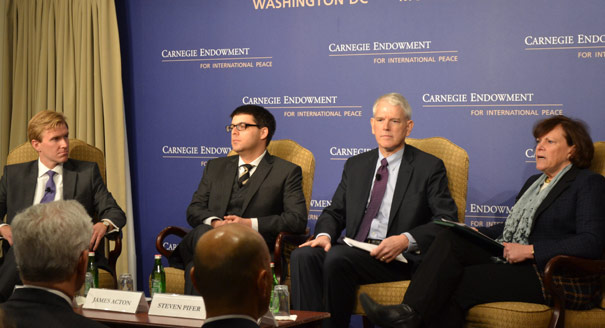Registration
You will receive an email confirming your registration.
Progress on reducing nuclear risks has stalled following a series of successes in 2010, including the negotiation and ratification of New START and a widely hailed Nuclear Posture Review. Now, as President Obama begins his second term, the prospects for establishing a new treaty facilitating deep cuts remains bleak. Carnegie‘s policy outlook, Beyond Treaties: Immediate Steps to Reduce Nuclear Dangers, summarizes steps the United States and Russia can take in the short term to enhance mutual security without a new treaty. Three of its authors—Carnegie’s James Acton, Steve Pifer of the Brookings Institution, and Elbridge Colby of the Center for Naval Analyses —discussed the future of arms control in President Obama’s second term in a conversation moderated by Jessica Mathews.
Prospects for a New Treaty
- Budget Constraints: Pifer noted that budget constrictions may provide new impetus for further nuclear reductions. Acton disagreed in the case of Russia, arguing that the new “heavy” missile Russia was developing would allow it maintain large forces relatively cheaply by placing multiple warheads on a single missile. Acton and Pifer—in contrast to Colby—agreed, however, that budget constraints should encourage the United States to reevaluate current defense spending on U.S. nuclear weapons.
- Asymmetric Forces: Pifer noted differences in how the United States and Russia have been implementing New START. Russia has taken complete missiles out of service, while the United States has been taking warheads off of missiles. He argued that an agreement to reduce the numbers of American strategic delivery vehicles may interest Russia. Colby argued that any future treaty should focus on strategic stability objectives, rather than numbers.
- Barriers to Negotiations: Acton noted differences in U.S. and Russian goals for arms control. U.S. officials are primarily concerned about Russian nuclear weapons, while Russian officials are most concerned about U.S. conventional weapons. This asymmetry will complicate future negotiations, he argued.
Alternatives to an Arms Control Treaty
Pifer, Acton, and Colby all agreed that even as the Obama administration pushes for a new treaty, it should also find incremental ways to maintain progress outside of a treaty based framework. Drawing from the Policy Outlook, Beyond Treaties, the speakers suggested steps to reduce nuclear risk in the short term while paving the way for a new treaty in the longer term:
- Resume Data Exchanges on Nuclear-Armed Sea-Launched Cruise Missiles: Acton relayed Jeffrey Lewis’ suggestion that the United States and Russia could resume data exchanges on sea-launched cruise missiles.
- Engage in Joint Verification Experiments: Acton also relayed Ambassador Linton Brooks’ recommendation for joint warhead-level verification experiments to lay the groundwork for the verification regime of a future treaty. For example, Russia and the United States could invite inspection of their storage facilities, initially under whatever security procedures the host state wanted (including the use of dummy warheads).
- Declare U.S. Missile Defenses: To address Russian fears about the potential for ballistic missile defense to undermine its nuclear deterrent, Pifer suggested that the United States make annual declarations of its missile defense plans to Russia, including the planned maximum number of interceptors and radars.
- Joint Studies on Cruise Missiles: Colby recommended that the U.S. National Academy of Science and the Russian Academy of Science could conduct joint analysis and experiments of the ability of conventional cruise missiles to damage or destroy nuclear silos, an issue over which Russian officials have repeatedly raised concerns. The United States would benefit from such a study because it would reduce the risk of its conventional cruise missiles deployments.
A Role for China?
- A Future Chinese Role: Pifer argued that the United States and Russia could have one more round of arms control before involving China.
- Engaging in Dialogue: Acton noted that the United States has had little success in bilateral talks with China about nuclear doctrine. He recommended that the United States focus on how U.S-Chinese interactions at the conventional level can drive instability at the nuclear level. In practical terms, for instance, they could agree to exchange data about Chinese conventional ballistic missiles and U.S. regional ballistic missile defenses.
